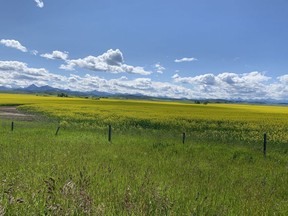
More dialogue and farmland protection should be a priority as the province grapples with a housing crisis, says the executive director of the Ontario Farmland Trust.
Advertisement 2
Article content
“Building more housing continues to be a priority for the provincial government but we have to use the right processes to get it right the first time,” Martin Straathof said. “If all we’re doing is paving over farmland in order to build houses, all we’re doing is trading one social issue for another social issue.”
Article content
Straathof said more input from more stakeholders can lead to housing availability and affordability while, at the same time, protecting farmland.
“The process needs to be well-thought out in advance rather than the province saying ‘here’s the solution we have and this is what we’re bringing forward,’” Straathof said.
The Ontario Farmland Trust works to protect and preserve farmland and agricultural, natural and cultural landscapes for food production for today future generations.
Advertisement 3
Article content
Straathof said the provincial government is signaling it is listening to the public and hearing its concerns. He hopes that going forward there will be a lot more pro-active conversations from the government that includes the farming community, conservation groups and housing advocates.
The provincial government has a goal of building 1.5 million homes by 2031. To meet that target, the province in 2022 removed 2,995 hectares from the protected Greenbelt to accommodate 50,000 homes. At the same time, the province added 3,800 hectares to the Greenbelt including land in Erin, Wellington County, that is part of the Paris Galt Moraine.
However, under pressure from the public and following two legislative watchdog probes on the decision, the then-Municipal Affairs and Housing Minister Steve Clark was forced to resign in early September 2023.
Advertisement 4
Article content
Clark has been replaced by Paul Calandra and the lands previously removed, have been returned to the Greenbelt. The lands added to the Greenbelt, including a section of the Paris-Galt Moraine, will remain in the protected area.
Meanwhile, the province has also reversed course on its expansion of urban boundaries for several communities including Guelph and Hamilton. The decision was also part of the government’s plan to build more housing.
However, Calandra has said the processes used by the previous housing minister’s office didn’t meet government standards. Municipal leaders from affected cities have said boundary expansions were not needed to build more housing.
“There continues to be a concern about housing affordability and the province continues to make it one of their priority mandates,” Straathof said. “But I think the government needs to recognize that it’s not just that people are upset about the Greenbelt.
“The issue of farmland loss in the province remains prevalent.”
Straathof said the province is a powerhouse of agricultural products and agriculture is critical to Ontario’s foundation.
“They need to make farmland protection a priority within their mandate as well,” Straathof said. “Hopefully, we’ll see that the government has connected those dots and recognize that it’s about housing, it’s about farmland protection and it’s about conservation.”
twitter.com/EXPVBall
Article content
Comments
Postmedia is committed to maintaining a lively but civil forum for discussion and encourages all readers to share their views on our articles. Comments may take up to one hour for moderation before appearing on the site. We ask you to keep your comments relevant and respectful. We have enabled email notifications—you will now receive an email if you receive a reply to your comment, there is an update to a comment thread you follow or if a user you follow comments. Visit our Community Guidelines for more information and details on how to adjust your email settings.